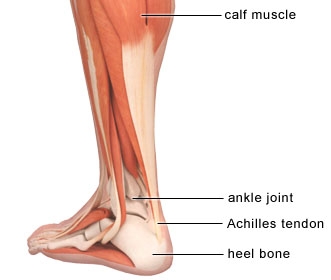Podiatry Specialist for Achilles Tendon Injury
Achilles tendon pain and tendinitis is caused by inflammation around the Achilles tendon. What some patients do not understand, however, is that chronic wear and tear can lead to further issues. The Achilles tendon is the main tendon in the back of the lower leg, and connects to the heel bone. The function of the Achilles tendon is to assist in walking and allowing the ankle to plantarflex or bend. Injuries can occur from a single event or chronic wear and tear.

Most Common Achilles Tendon Injuries and Causes
An isolated, single injury may cause an acute rupture or partial rupture. Most patients describe this injury as a pop to the back of their leg with intense, immediate pain. Some state that they feel like a gun shot wound occurred to their back of their heel. Chronic tendinitis of the Achilles tendon can lead to scarring and structural changes within the tendon. Patients do not always recall a traumatic event in this case, but over the course of time, the Achilles tendon becomes more painful, swollen and enlarged which leads to difficulty walking. Achilles Tendonitis can cause further issues of their knees, back, shoulder and neck. The pain is often located 3-6 centimeters up the leg from the attachment point on the back of the heel bone. The is described as aching or soreness, occurring with walking and activity. The pain can progressively become worse.
Popular Treatments of Achilles Tendon Ruptures and Pain
Treatment of Achilles tendon ruptures is absolutely necessary to improve the patient’s functional outcome. Treatment may be conservative with casting and immobilization in a boot or surgical repair of the tendon. Chronic injuries and tendonitis is treated with anti-inflammatory medication, stretching, icing and physical therapy. When Achilles tendinitis does not respond to conservative care various surgical options are available. Surgical options include open debridement (removal of diseased tendon) and repair of small tears. Platelet Gel injections as well as use of Tenex device are new minimally invasive options that are showing promising results.

For more information regarding your Achilles tendon injury or to schedule your first appointment with Worthington Foot & Ankle,